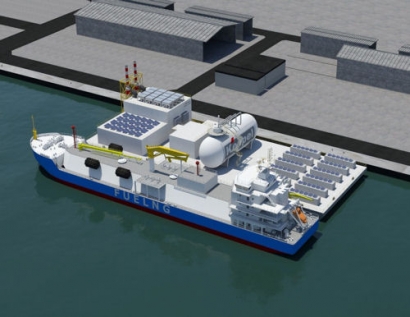
The FLL project comprises a floating barge with LNG bunkering facilities for harbor crafts and small vessels. It will also house an embedded power generation system to power Keppel O&M’s operations, with excess electricity to be exported to the national grid or stored in the FLL’s Energy Storage Systems.
The power generation system will operate on two Wärtsilä 34SG engines running on natural gas/LNG and having a combined output of 11.6 MW. The Wärtsilä engines are also capable of operating on gas with up to 3% hydrogen, and with modifications can utilize up to 25% hydrogen. The engines are scheduled for delivery in the third quarter of 2021, and the power generation system is expected to be fully operational by the first quarter of 2022.
“As the maritime industry moves towards cleaner energy solutions, Keppel O&M is leveraging its expertise to optimize energy consumption and reduce carbon emissions for marine vessels by exploring different energy mixes such as blending hydrogen into LNG, and using its Floating Living Lab to test bed these solutions. This is in line with Keppel’s Vision 2030, which includes seizing opportunities in new energy such as hydrogen. We are looking for future-proof solutions and engines with overall efficiency and capability for burning hydrogen was an important consideration in the award of this contract,” said Tan Leong Peng, Managing, Keppel O&M.
“The Wärtsilä generating sets will use the boil-off gas from the LNG process for power generation, and will be running in parallel with the grid, energy storage, and solar energy. With the focus being on developing competences for greener fuels, our solutions for incorporating future fuels, such as hydrogen, is gaining solid interest for innovative projects such as this one,” commented Nicolas Leong, Energy Business Director, North & South East Asia, Wärtsilä.
Wärtsilä has a long relationship with Keppel O&M with whom the company has partnered in several marine projects.

